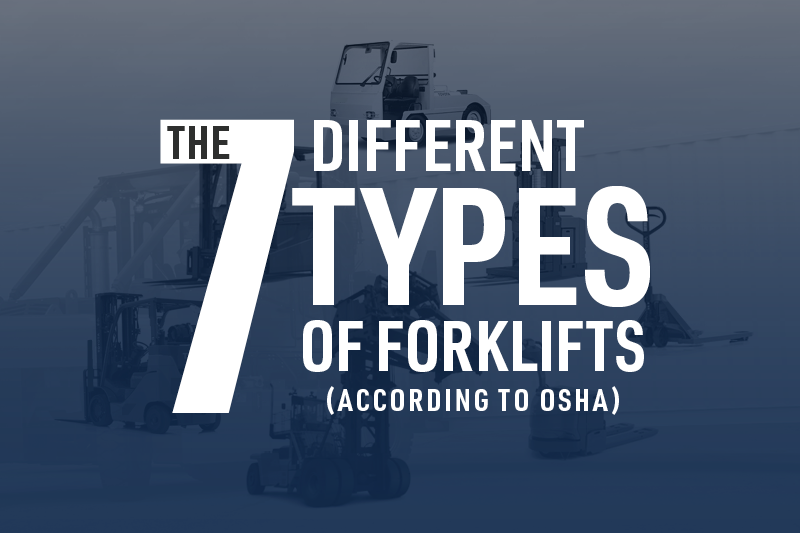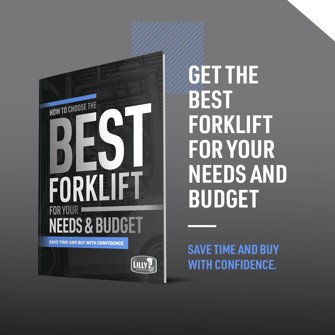3 min read
The 7 Different Types of Forklifts (According to OSHA)
John Wofford
Sep 17, 2021 6:00:00 PM

.png?width=1200&name=The%207%20Different%20Types%20of%20Forklifts%20(According%20to%20OSHA).png)
If you’re looking at forklifts for sale, you may have seen descriptions such as: counterbalanced lift trucks (class 4) or electric-powered rider trucks (class 1) and wondered, “what the heck?”
OSHA’s classifications don’t always match the everyday terms we use. For example, what OSHA calls “class 4,” most people know as an internal combustion forklift with cushion tires.
In this article, we'll explain OSHA’s forklift classifications and share some interesting stats about which lift trucks are the most popular. The list may surprise you…
Forklift Types and OSHA Classifications
OSHA’s forklift classification system includes forklifts and other powered lifting equipment such as:
- Battery-powered (electric) forklifts
- Internal combustion (IC) forklifts
- Powered pallet jacks
- Order pickers
- Reach trucks
- Tow Tractors
- High-capacity forklifts
- Rough terrain forklifts
But OSHA doesn’t use the descriptions above to classify forklifts. For example, IC-powered forklifts are divided into two different classes, one for cushion tires and one for pneumatic. Electric forklifts are also broken into two classes but not based upon tire type.
It can be a bit confusing, so we created the guide below to help buyers sort things out. We’ve also included some stats from Modern Materials Handling about which forklifts are the most popular.
The 7 OSHA Forklift Classifications
Class 1 - Battery-powered electric forklifts, including counterbalanced (sit down) and stand-up forklifts. Class 1 forklifts are by far the most popular type of lift truck. Roughly two out of every three new forklifts purchased in the U.S. (and around the world) is a class 1, and more than 60 percent of operations surveyed by Modern Material Handling own a class 1 forklift.
Class 2 - This group includes forklifts you typically find in narrow-aisle applications such as: reach trucks, order pickers, side-loaders, stackers and turret trucks. The popularity of class 2 lifting equipment has dipped in the past few years, but they remain popular. About 40 percent of operations have a class 2 lift truck.
Class 3 - Powered pallet jacks are the second most popular class of lifting equipment. Nearly 50 percent of businesses use an electric-powered pallet jack, walkie pallet jack, center-controlled rider, stacker, or small tow tractor.
Class 4 - Internal combustion (IC) powered counterbalance forklifts with cushion tires are considered “class 4.” One of the most common class 4 forklifts is LP gas. These warehouse workhorses are the fourth most common type of forklift, but their popularity is declining. In 2019, 41 percent of facilities reported using an IC cushion forklift, but that number has dropped to less than one-third.
Class 5 - An IC-powered counterbalance forklift with pneumatic tires is considered a class 5 forklift. This type of forklift typically operates outdoors. Only one in four operations use a class 5 lift truck.
Class 6 - Ride-on tow tractors, whether electric or IC-powered, are considered class 6. Slightly less than one in ten operations use this type of equipment.
Class 7 - Last but not least are the rough, tough, go-anywhere rough terrain lift trucks. This type of forklift is only used in specialized applications. As a result, only about 1 in 10 businesses use a class 7 forklift.
Forklift Buying Tips
Whether you’re buying your first forklift or just want to quickly narrow down your options, our experienced forklift experts are here to help. At The Lilly Company, we take a personal interest in helping you get the right forklift for your needs. We’ll take the time to learn about your operation and its goals before we recommend equipment.
The Lilly Company is an authorized forklift dealer for Toyota, Clark, Linde and Komatsu serving customers throughout Alabama, Mississippi, Tennessee and eastern Arkansas. Contact a forklift expert at The Lilly Company online or by phone 800-238-3006 with any questions you have, or visit us at one of our 13 locations across the Mid-South.
Arkansas - Jonesboro
Alabama - Birmingham, Dothan, Irondale, Madison, Mobile, and Montgomery
Mississippi - Tupelo and Richland
Tennessee - Jackson, Kingsport, Knoxville, and Memphis
If you’re not ready to connect with an equipment expert, start with our free guide: How To Choose the Best Forklift for Your Needs and Budget. Save time and buy with confidence when you know:
- Key questions to help you avoid buying the wrong forklift
- When to choose an electric vs. internal combustion forklift
- What tires and attachments you may need
- How to get the maximum forklift for your money
- Important questions buyers forget to ask
Further Reading:
When To Buy an Electric vs. LP Gas Forklift
When To Buy a New vs. Used Forklift
Used Forklift Buyer’s Guide and Checklist
Posts by Tag
- Forklift (67)
- Forklift Service (21)
- Electric Forklifts (18)
- Forklift Safety (15)
- Warehouse Automation (14)
- Forklift Attachments (12)
- Product Review (12)
- Toyota Forklifts (12)
- Warehouse Planning (11)
- Parts (10)
- Customer Solutions (9)
- Clark Forklifts (8)
- Pallet Racking (8)
- Forklift Rental (7)
- Loading Docks (7)
- Material Handling Education (7)
- Purchasing Options (7)
- Aerial Equipment (6)
- Forklift Batteries (6)
- Forklift Tires (5)
- Heavy Equipment (5)
- Forklift Accessories (4)
- Forklift Fleet Management (4)
- Forklift Training (4)
- Pallet Jacks (4)
- Products (4)
- Utility Vehicles (4)
- Yard Spotter Trucks (4)
- Komatsu (3)
- Linde (3)
- Specialty Forklifts (3)
- Used Equipment (3)
- Warehouse Doors (3)
- Custom Shop (2)
- IC Forklifts (2)
- Manitou (2)
- COMBiLift (1)
- Forklift Brakes (1)
- Forklift Warranty (1)
- Gehl (1)
- Recruitment (1)








